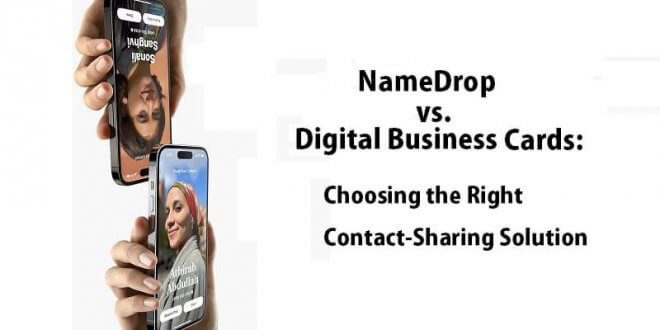Compare NameDrop vs Digital Business Cards to find the perfect contact-sharing solution. Make the right choice for efficient and effective networking.
Networking is very important for making connections, attracting clients, forming partnerships, and growing your professional circle. While nothing replaces the value of in-person interactions, digital transformation has led to innovative new ways to exchange contact information through virtual methods.
Two popular contact-sharing solutions that have emerged are Apple’s NameDrop feature and digital business cards. But how exactly do these options compare regarding capabilities and use cases?
To address this question, we have this article for you where we will discuss each platform’s key distinctions, pros, and cons to help you determine the right fit for your needs.
NameDrop vs. digital business cards
Understanding How NameDrop Works
Introduced alongside iOS 17, NameDrop delivers a way for iPhone and Apple Watch users to share contacts using device-to-device communication.
Leveraging integrated NFC technology, Apple devices can exchange information when brought nearby. A visually engaging animation pops up, showing the user’s contact photo and prompting them to either share their virtual business card or receive one from another user.
Once received, the VCF file can be directly saved into your iPhone contacts, edited if needed, and seamlessly synced across Apple devices due to ecosystem integration. It serves useful basic contact-sharing purposes with minimal manual effort.
However, there are limitations to examine before declaring NameDrop the standout networking solution.
Key Advantages of NameDrop
- Seamless user experience for the Apple ecosystem
- leverages an intuitive AirDrop interface
- Share selective information for more privacy
- Saves time over manual contact entry.
- There is no need to download additional apps.
- Easy transfer and syncing across Apple devices
Disadvantages and Limitations
- Tied exclusively to Apple platforms
- It relies on NFC, so devices must be in close contact.
- Focus only on essential contact sharing.
- Lack of analytics for performance insights
- No centralized management for teams
- Sparse customization options beyond adding a profile photo
This is where we need to look at the capabilities of feature-rich digital business card solutions.
Digital business cards deliver versatility, customization, and insights.
While NameDrop delivers an integrated experience for iOS users, its selective feature set warrants examining alternative options capable of serving expansive business use cases across platforms.
Digital business card solutions allow individuals and organizations to create personalized branding profiles with interactive elements for sharing online or in person. Beyond housing basic contact information, these customizable platforms enable users to incorporate multimedia, links, analytics, and more.
Let’s compare some key advantages of digital business cards for streamlined networking and contact sharing.
Cross-Platform Convenience
Unlike NameDrop’s Apple exclusivity, digital business cards provide flexible accessibility across devices, operating systems, and browsers. This enables seamless sharing capabilities regardless of the recipients’ tech stack. Whether interacting at conferences, meetings, or virtual events, credentials can be exchanged easily without limitations.
Robust Analytics and Actionable Insights
Analytics is notably absent from NameDrop, given its primary focus on fast contact transfers. However, digital business cards offer valuable tracking and reporting around engagement metrics and card performance. Monitoring analytics offers data-backed insights to enhance your networking and outreach approaches over time.
Centralized Team Management
NameDrop only allows individual users to manage their profiles. However, digital business cards enable centralized oversight, which is ideal for small to large organizations. Admins can add team members, control branding assets, set user permissions, and more to ensure brand consistency.
Extensive personalization options
While NameDrop offers a standardized format beyond a profile photo, business card platforms provide numerous templates, design widgets, business card mockups, branding customizations, and layout tools for showcasing your organization authentically. Dynamic elements like logos, colors, content sections, website integration, and more can elevate your brand image through a sleek digital card.
Diverse Contact Sharing Methods
NameDrop’s reliance on NFC contact sharing has limitations that digital cards can overcome. They allow users to share information online through URL links, embeddable website badges, QR codes for scanning, one-tap NFC-enabled cards and stickers, downloads, and messaging integrations. This multifaceted approach breaks through proximity barriers to enable connections from anywhere.
Seamless Integrations and Workflows
In contrast to NameDrop’s focus strictly on contact transfers, digital business cards also integrate tightly with external tools you already use, like email providers, messaging apps, CRM software, appointment schedulers, social media, and more. This amplifies productivity by eliminating tedious manual follow-ups.
Which option should you choose?
Evaluating NameDrop vs. digital business cards solution involves prioritizing your key requirements and use cases to determine the best fit.
For Apple users who highly value ecosystem cohesion, efficiency, and privacy controls for quick contact sharing, NameDrop has compelling advantages. It streamlines vital networking interactions conveniently while saving time over manual data entry.
However, businesses and professionals with more advanced networking needs may benefit more from scalable digital card solutions. Capabilities like cross-platform flexibility, custom branding, in-depth analytics, diverse sharing methods, and also workflow automation can transform networking and relationship-building activities.
Conclusion
Effective business networking today requires the use of technology to enhance real-world connections while also supporting data-driven insights. Although NameDrop delivers value within the Apple ecosystem, evaluating versatile digital business card solutions can make your outreach more strategic.
Prioritizing essential capabilities around analytics, customization, and also seamless accessibility turns contact sharing into an impactful activity that nurtures relationships and forges new opportunities over time. Choose wisely based on your needs to elevate your networking productivity.
 free html design Free html design templates
free html design Free html design templates






